International Business Case: McDonald's & External Environment Factors
VerifiedAdded on 2023/06/13
|8
|2551
|269
Case Study
AI Summary
This case study examines McDonald's international business operations, focusing on the impact of various external factors. It explores how socio-economic cultures influence McDonald's strategies, such as adapting menus to local preferences in India and Japan. The report also discusses the role of technological advancements, including self-order kiosks and personalized menus, in enhancing customer service. Furthermore, it analyzes the influence of the political environment, including government regulations and legal challenges, on McDonald's operations in different countries. Finally, the study addresses ecological factors and McDonald's efforts towards sustainability, such as reducing plastic usage and promoting renewable packaging. The analysis uses a PESTLE framework to highlight the critical factors affecting McDonald's global strategy and its need to adapt to diverse international markets.
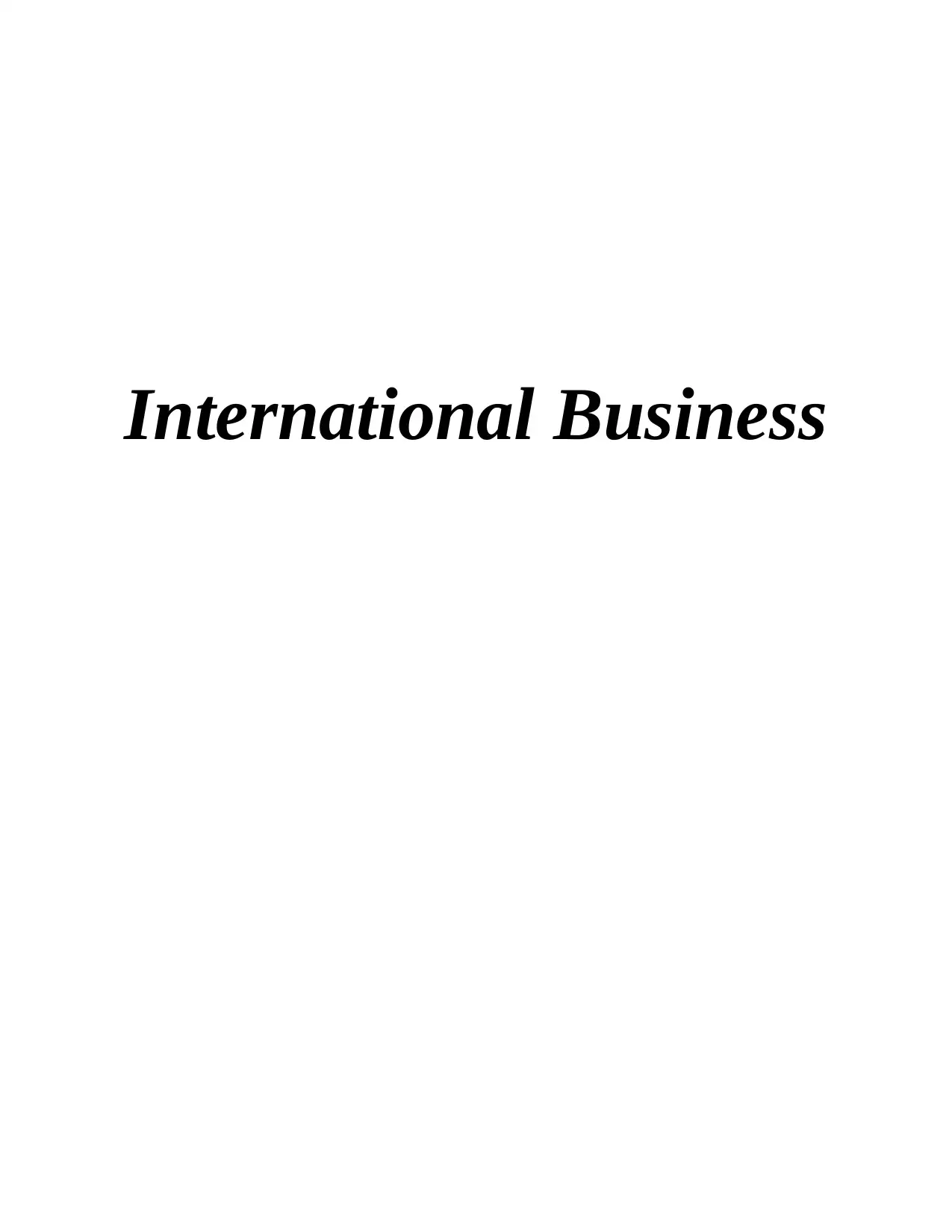
International Business
Paraphrase This Document
Need a fresh take? Get an instant paraphrase of this document with our AI Paraphraser
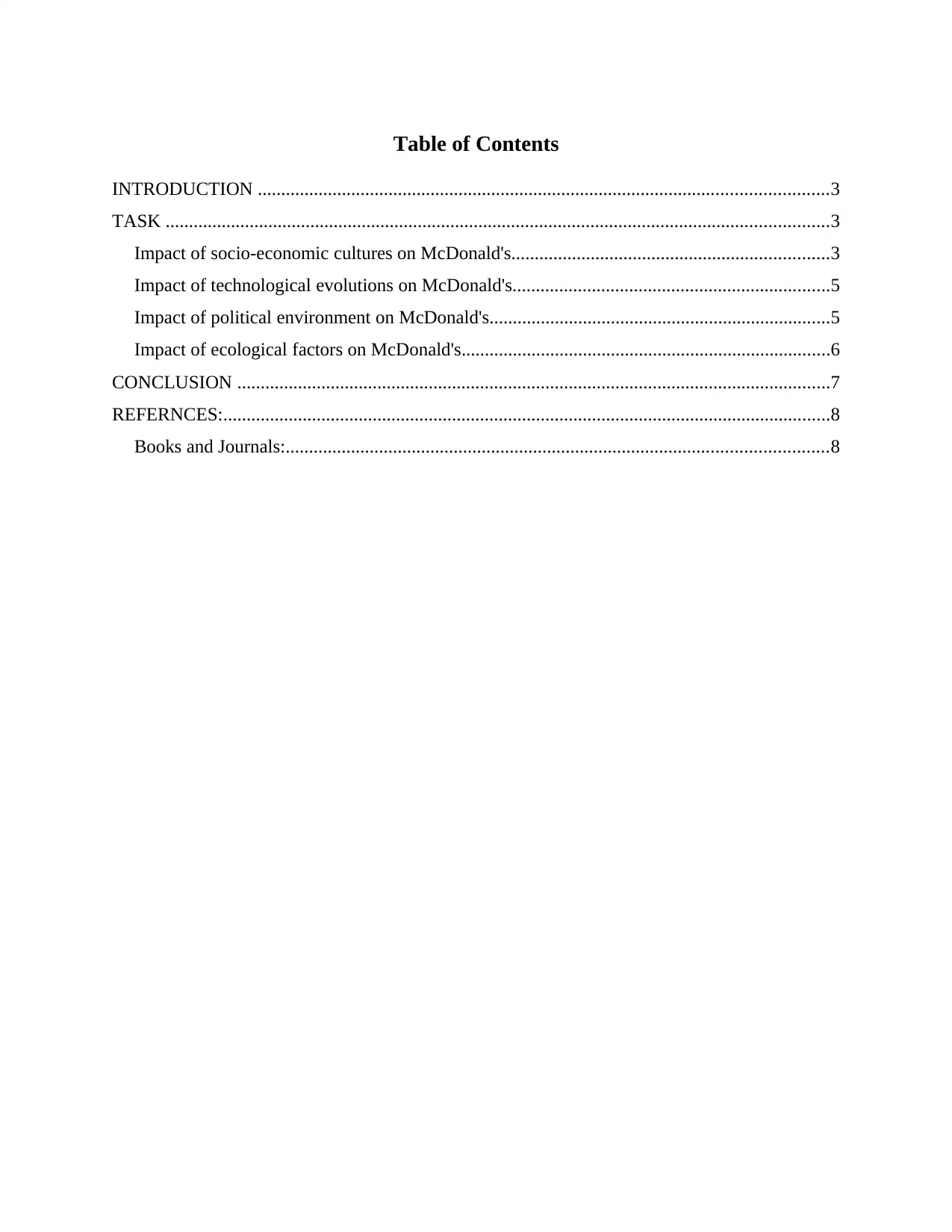
Table of Contents
INTRODUCTION ..........................................................................................................................3
TASK ..............................................................................................................................................3
Impact of socio-economic cultures on McDonald's....................................................................3
Impact of technological evolutions on McDonald's....................................................................5
Impact of political environment on McDonald's.........................................................................5
Impact of ecological factors on McDonald's...............................................................................6
CONCLUSION ...............................................................................................................................7
REFERNCES:..................................................................................................................................8
Books and Journals:....................................................................................................................8
INTRODUCTION ..........................................................................................................................3
TASK ..............................................................................................................................................3
Impact of socio-economic cultures on McDonald's....................................................................3
Impact of technological evolutions on McDonald's....................................................................5
Impact of political environment on McDonald's.........................................................................5
Impact of ecological factors on McDonald's...............................................................................6
CONCLUSION ...............................................................................................................................7
REFERNCES:..................................................................................................................................8
Books and Journals:....................................................................................................................8
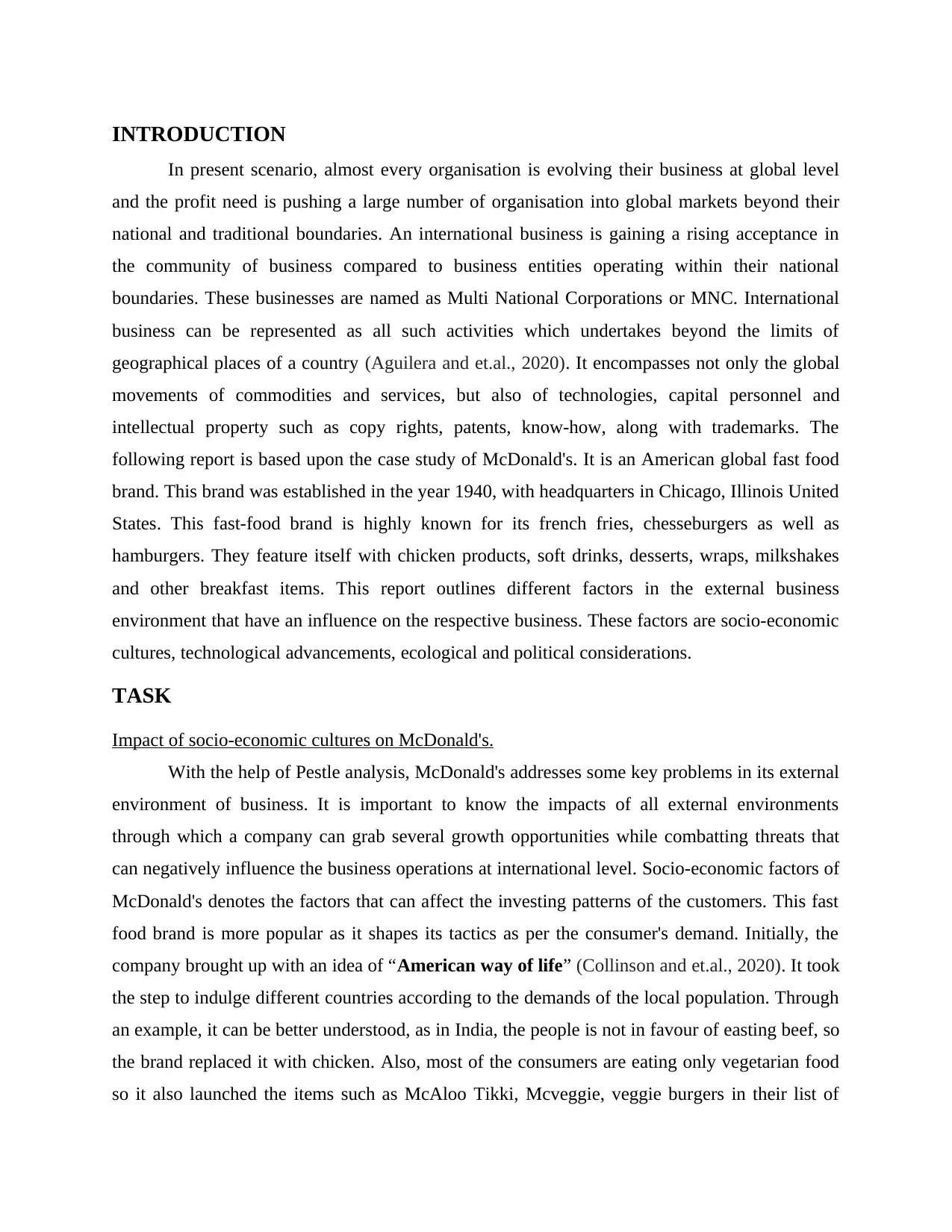
INTRODUCTION
In present scenario, almost every organisation is evolving their business at global level
and the profit need is pushing a large number of organisation into global markets beyond their
national and traditional boundaries. An international business is gaining a rising acceptance in
the community of business compared to business entities operating within their national
boundaries. These businesses are named as Multi National Corporations or MNC. International
business can be represented as all such activities which undertakes beyond the limits of
geographical places of a country (Aguilera and et.al., 2020). It encompasses not only the global
movements of commodities and services, but also of technologies, capital personnel and
intellectual property such as copy rights, patents, know-how, along with trademarks. The
following report is based upon the case study of McDonald's. It is an American global fast food
brand. This brand was established in the year 1940, with headquarters in Chicago, Illinois United
States. This fast-food brand is highly known for its french fries, chesseburgers as well as
hamburgers. They feature itself with chicken products, soft drinks, desserts, wraps, milkshakes
and other breakfast items. This report outlines different factors in the external business
environment that have an influence on the respective business. These factors are socio-economic
cultures, technological advancements, ecological and political considerations.
TASK
Impact of socio-economic cultures on McDonald's.
With the help of Pestle analysis, McDonald's addresses some key problems in its external
environment of business. It is important to know the impacts of all external environments
through which a company can grab several growth opportunities while combatting threats that
can negatively influence the business operations at international level. Socio-economic factors of
McDonald's denotes the factors that can affect the investing patterns of the customers. This fast
food brand is more popular as it shapes its tactics as per the consumer's demand. Initially, the
company brought up with an idea of “American way of life” (Collinson and et.al., 2020). It took
the step to indulge different countries according to the demands of the local population. Through
an example, it can be better understood, as in India, the people is not in favour of easting beef, so
the brand replaced it with chicken. Also, most of the consumers are eating only vegetarian food
so it also launched the items such as McAloo Tikki, Mcveggie, veggie burgers in their list of
In present scenario, almost every organisation is evolving their business at global level
and the profit need is pushing a large number of organisation into global markets beyond their
national and traditional boundaries. An international business is gaining a rising acceptance in
the community of business compared to business entities operating within their national
boundaries. These businesses are named as Multi National Corporations or MNC. International
business can be represented as all such activities which undertakes beyond the limits of
geographical places of a country (Aguilera and et.al., 2020). It encompasses not only the global
movements of commodities and services, but also of technologies, capital personnel and
intellectual property such as copy rights, patents, know-how, along with trademarks. The
following report is based upon the case study of McDonald's. It is an American global fast food
brand. This brand was established in the year 1940, with headquarters in Chicago, Illinois United
States. This fast-food brand is highly known for its french fries, chesseburgers as well as
hamburgers. They feature itself with chicken products, soft drinks, desserts, wraps, milkshakes
and other breakfast items. This report outlines different factors in the external business
environment that have an influence on the respective business. These factors are socio-economic
cultures, technological advancements, ecological and political considerations.
TASK
Impact of socio-economic cultures on McDonald's.
With the help of Pestle analysis, McDonald's addresses some key problems in its external
environment of business. It is important to know the impacts of all external environments
through which a company can grab several growth opportunities while combatting threats that
can negatively influence the business operations at international level. Socio-economic factors of
McDonald's denotes the factors that can affect the investing patterns of the customers. This fast
food brand is more popular as it shapes its tactics as per the consumer's demand. Initially, the
company brought up with an idea of “American way of life” (Collinson and et.al., 2020). It took
the step to indulge different countries according to the demands of the local population. Through
an example, it can be better understood, as in India, the people is not in favour of easting beef, so
the brand replaced it with chicken. Also, most of the consumers are eating only vegetarian food
so it also launched the items such as McAloo Tikki, Mcveggie, veggie burgers in their list of
⊘ This is a preview!⊘
Do you want full access?
Subscribe today to unlock all pages.

Trusted by 1+ million students worldwide
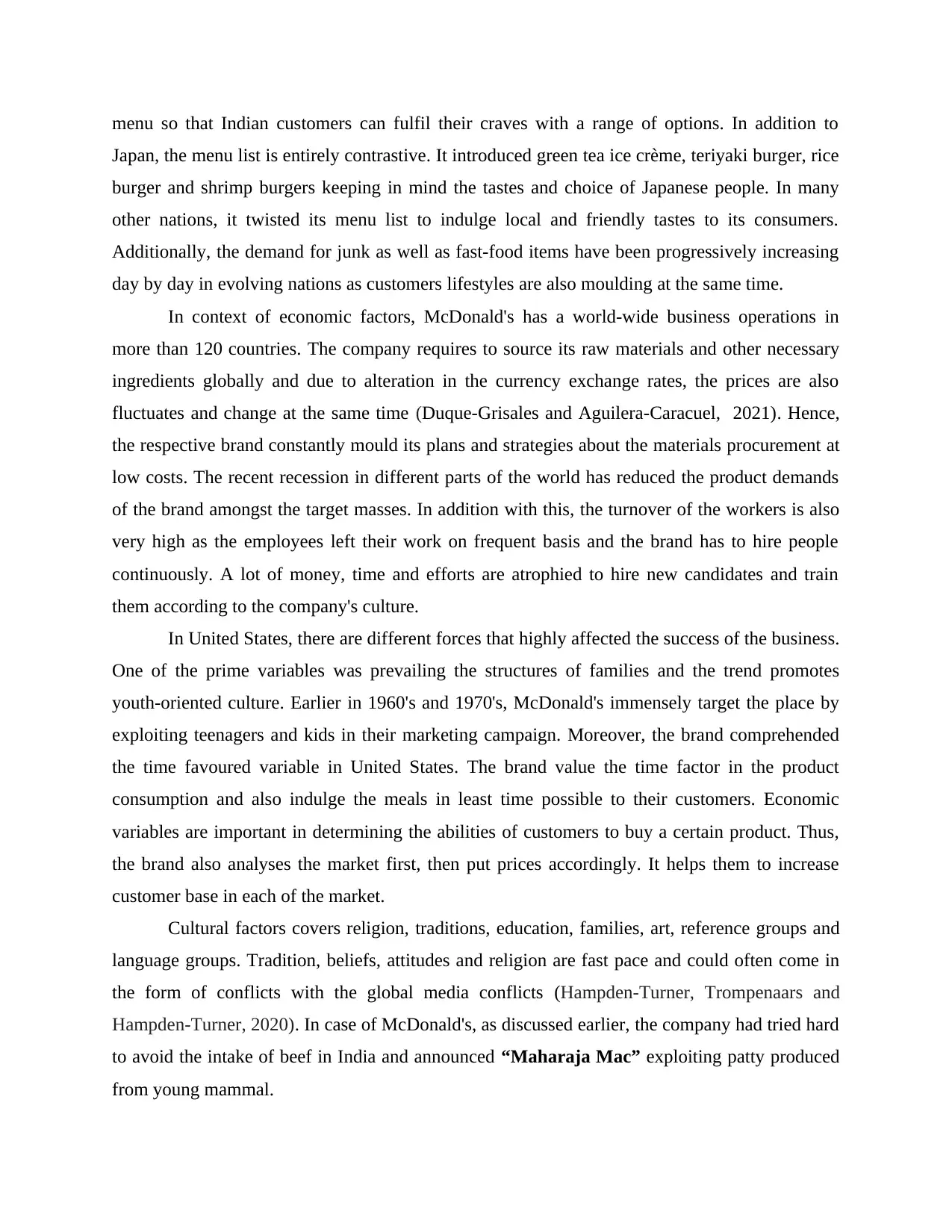
menu so that Indian customers can fulfil their craves with a range of options. In addition to
Japan, the menu list is entirely contrastive. It introduced green tea ice crème, teriyaki burger, rice
burger and shrimp burgers keeping in mind the tastes and choice of Japanese people. In many
other nations, it twisted its menu list to indulge local and friendly tastes to its consumers.
Additionally, the demand for junk as well as fast-food items have been progressively increasing
day by day in evolving nations as customers lifestyles are also moulding at the same time.
In context of economic factors, McDonald's has a world-wide business operations in
more than 120 countries. The company requires to source its raw materials and other necessary
ingredients globally and due to alteration in the currency exchange rates, the prices are also
fluctuates and change at the same time (Duque-Grisales and Aguilera-Caracuel, 2021). Hence,
the respective brand constantly mould its plans and strategies about the materials procurement at
low costs. The recent recession in different parts of the world has reduced the product demands
of the brand amongst the target masses. In addition with this, the turnover of the workers is also
very high as the employees left their work on frequent basis and the brand has to hire people
continuously. A lot of money, time and efforts are atrophied to hire new candidates and train
them according to the company's culture.
In United States, there are different forces that highly affected the success of the business.
One of the prime variables was prevailing the structures of families and the trend promotes
youth-oriented culture. Earlier in 1960's and 1970's, McDonald's immensely target the place by
exploiting teenagers and kids in their marketing campaign. Moreover, the brand comprehended
the time favoured variable in United States. The brand value the time factor in the product
consumption and also indulge the meals in least time possible to their customers. Economic
variables are important in determining the abilities of customers to buy a certain product. Thus,
the brand also analyses the market first, then put prices accordingly. It helps them to increase
customer base in each of the market.
Cultural factors covers religion, traditions, education, families, art, reference groups and
language groups. Tradition, beliefs, attitudes and religion are fast pace and could often come in
the form of conflicts with the global media conflicts (Hampden-Turner, Trompenaars and
Hampden-Turner, 2020). In case of McDonald's, as discussed earlier, the company had tried hard
to avoid the intake of beef in India and announced “Maharaja Mac” exploiting patty produced
from young mammal.
Japan, the menu list is entirely contrastive. It introduced green tea ice crème, teriyaki burger, rice
burger and shrimp burgers keeping in mind the tastes and choice of Japanese people. In many
other nations, it twisted its menu list to indulge local and friendly tastes to its consumers.
Additionally, the demand for junk as well as fast-food items have been progressively increasing
day by day in evolving nations as customers lifestyles are also moulding at the same time.
In context of economic factors, McDonald's has a world-wide business operations in
more than 120 countries. The company requires to source its raw materials and other necessary
ingredients globally and due to alteration in the currency exchange rates, the prices are also
fluctuates and change at the same time (Duque-Grisales and Aguilera-Caracuel, 2021). Hence,
the respective brand constantly mould its plans and strategies about the materials procurement at
low costs. The recent recession in different parts of the world has reduced the product demands
of the brand amongst the target masses. In addition with this, the turnover of the workers is also
very high as the employees left their work on frequent basis and the brand has to hire people
continuously. A lot of money, time and efforts are atrophied to hire new candidates and train
them according to the company's culture.
In United States, there are different forces that highly affected the success of the business.
One of the prime variables was prevailing the structures of families and the trend promotes
youth-oriented culture. Earlier in 1960's and 1970's, McDonald's immensely target the place by
exploiting teenagers and kids in their marketing campaign. Moreover, the brand comprehended
the time favoured variable in United States. The brand value the time factor in the product
consumption and also indulge the meals in least time possible to their customers. Economic
variables are important in determining the abilities of customers to buy a certain product. Thus,
the brand also analyses the market first, then put prices accordingly. It helps them to increase
customer base in each of the market.
Cultural factors covers religion, traditions, education, families, art, reference groups and
language groups. Tradition, beliefs, attitudes and religion are fast pace and could often come in
the form of conflicts with the global media conflicts (Hampden-Turner, Trompenaars and
Hampden-Turner, 2020). In case of McDonald's, as discussed earlier, the company had tried hard
to avoid the intake of beef in India and announced “Maharaja Mac” exploiting patty produced
from young mammal.
Paraphrase This Document
Need a fresh take? Get an instant paraphrase of this document with our AI Paraphraser
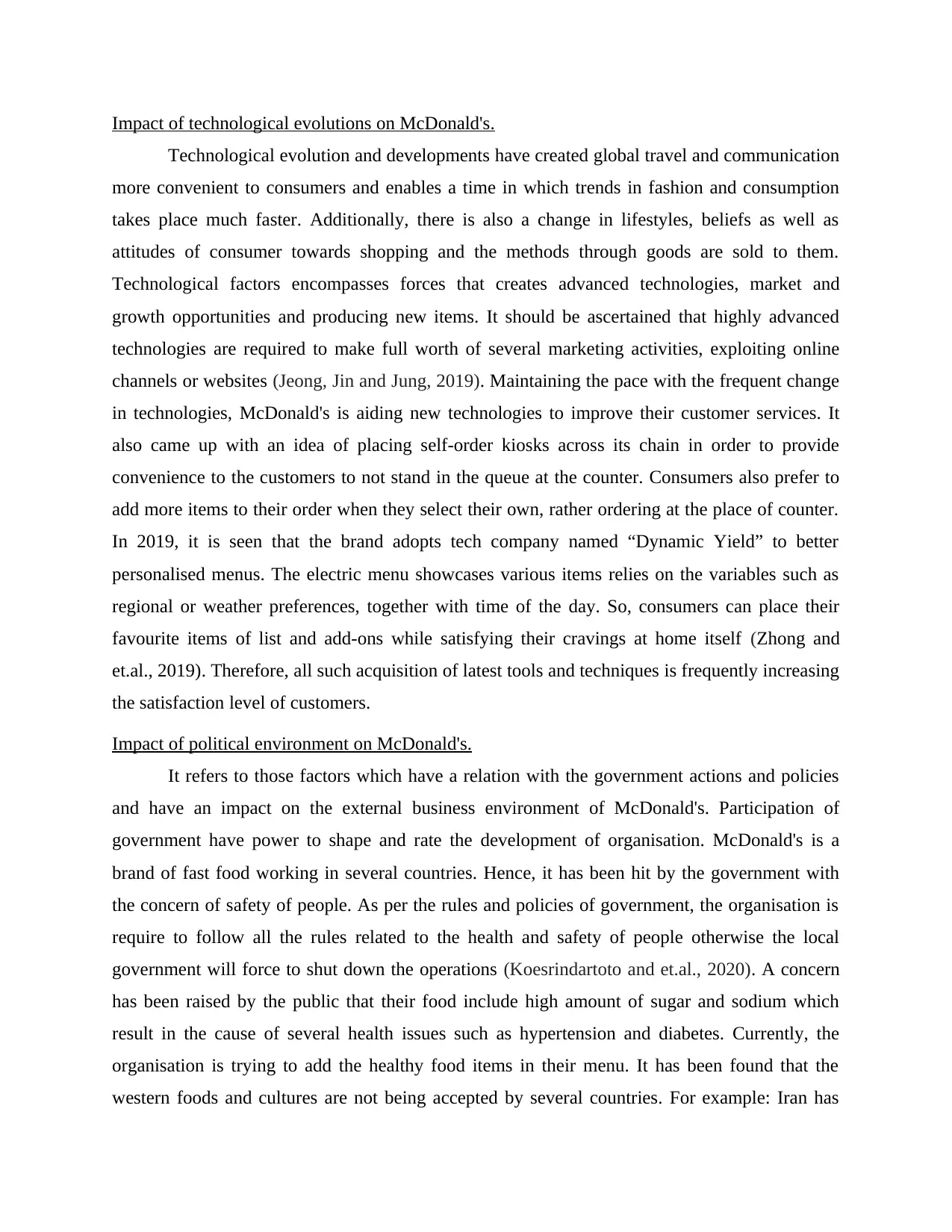
Impact of technological evolutions on McDonald's.
Technological evolution and developments have created global travel and communication
more convenient to consumers and enables a time in which trends in fashion and consumption
takes place much faster. Additionally, there is also a change in lifestyles, beliefs as well as
attitudes of consumer towards shopping and the methods through goods are sold to them.
Technological factors encompasses forces that creates advanced technologies, market and
growth opportunities and producing new items. It should be ascertained that highly advanced
technologies are required to make full worth of several marketing activities, exploiting online
channels or websites (Jeong, Jin and Jung, 2019). Maintaining the pace with the frequent change
in technologies, McDonald's is aiding new technologies to improve their customer services. It
also came up with an idea of placing self-order kiosks across its chain in order to provide
convenience to the customers to not stand in the queue at the counter. Consumers also prefer to
add more items to their order when they select their own, rather ordering at the place of counter.
In 2019, it is seen that the brand adopts tech company named “Dynamic Yield” to better
personalised menus. The electric menu showcases various items relies on the variables such as
regional or weather preferences, together with time of the day. So, consumers can place their
favourite items of list and add-ons while satisfying their cravings at home itself (Zhong and
et.al., 2019). Therefore, all such acquisition of latest tools and techniques is frequently increasing
the satisfaction level of customers.
Impact of political environment on McDonald's.
It refers to those factors which have a relation with the government actions and policies
and have an impact on the external business environment of McDonald's. Participation of
government have power to shape and rate the development of organisation. McDonald's is a
brand of fast food working in several countries. Hence, it has been hit by the government with
the concern of safety of people. As per the rules and policies of government, the organisation is
require to follow all the rules related to the health and safety of people otherwise the local
government will force to shut down the operations (Koesrindartoto and et.al., 2020). A concern
has been raised by the public that their food include high amount of sugar and sodium which
result in the cause of several health issues such as hypertension and diabetes. Currently, the
organisation is trying to add the healthy food items in their menu. It has been found that the
western foods and cultures are not being accepted by several countries. For example: Iran has
Technological evolution and developments have created global travel and communication
more convenient to consumers and enables a time in which trends in fashion and consumption
takes place much faster. Additionally, there is also a change in lifestyles, beliefs as well as
attitudes of consumer towards shopping and the methods through goods are sold to them.
Technological factors encompasses forces that creates advanced technologies, market and
growth opportunities and producing new items. It should be ascertained that highly advanced
technologies are required to make full worth of several marketing activities, exploiting online
channels or websites (Jeong, Jin and Jung, 2019). Maintaining the pace with the frequent change
in technologies, McDonald's is aiding new technologies to improve their customer services. It
also came up with an idea of placing self-order kiosks across its chain in order to provide
convenience to the customers to not stand in the queue at the counter. Consumers also prefer to
add more items to their order when they select their own, rather ordering at the place of counter.
In 2019, it is seen that the brand adopts tech company named “Dynamic Yield” to better
personalised menus. The electric menu showcases various items relies on the variables such as
regional or weather preferences, together with time of the day. So, consumers can place their
favourite items of list and add-ons while satisfying their cravings at home itself (Zhong and
et.al., 2019). Therefore, all such acquisition of latest tools and techniques is frequently increasing
the satisfaction level of customers.
Impact of political environment on McDonald's.
It refers to those factors which have a relation with the government actions and policies
and have an impact on the external business environment of McDonald's. Participation of
government have power to shape and rate the development of organisation. McDonald's is a
brand of fast food working in several countries. Hence, it has been hit by the government with
the concern of safety of people. As per the rules and policies of government, the organisation is
require to follow all the rules related to the health and safety of people otherwise the local
government will force to shut down the operations (Koesrindartoto and et.al., 2020). A concern
has been raised by the public that their food include high amount of sugar and sodium which
result in the cause of several health issues such as hypertension and diabetes. Currently, the
organisation is trying to add the healthy food items in their menu. It has been found that the
western foods and cultures are not being accepted by several countries. For example: Iran has
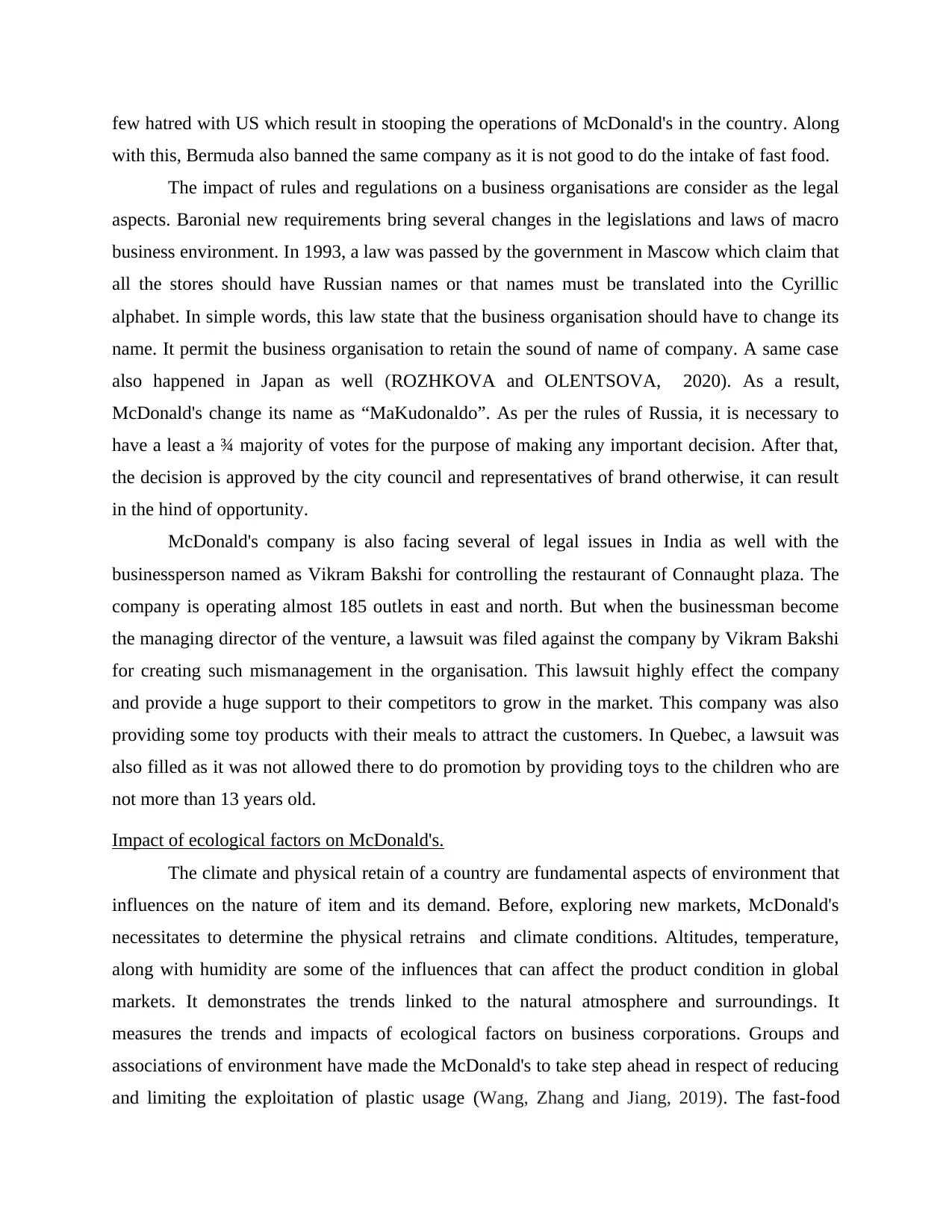
few hatred with US which result in stooping the operations of McDonald's in the country. Along
with this, Bermuda also banned the same company as it is not good to do the intake of fast food.
The impact of rules and regulations on a business organisations are consider as the legal
aspects. Baronial new requirements bring several changes in the legislations and laws of macro
business environment. In 1993, a law was passed by the government in Mascow which claim that
all the stores should have Russian names or that names must be translated into the Cyrillic
alphabet. In simple words, this law state that the business organisation should have to change its
name. It permit the business organisation to retain the sound of name of company. A same case
also happened in Japan as well (ROZHKOVA and OLENTSOVA, 2020). As a result,
McDonald's change its name as “MaKudonaldo”. As per the rules of Russia, it is necessary to
have a least a ¾ majority of votes for the purpose of making any important decision. After that,
the decision is approved by the city council and representatives of brand otherwise, it can result
in the hind of opportunity.
McDonald's company is also facing several of legal issues in India as well with the
businessperson named as Vikram Bakshi for controlling the restaurant of Connaught plaza. The
company is operating almost 185 outlets in east and north. But when the businessman become
the managing director of the venture, a lawsuit was filed against the company by Vikram Bakshi
for creating such mismanagement in the organisation. This lawsuit highly effect the company
and provide a huge support to their competitors to grow in the market. This company was also
providing some toy products with their meals to attract the customers. In Quebec, a lawsuit was
also filled as it was not allowed there to do promotion by providing toys to the children who are
not more than 13 years old.
Impact of ecological factors on McDonald's.
The climate and physical retain of a country are fundamental aspects of environment that
influences on the nature of item and its demand. Before, exploring new markets, McDonald's
necessitates to determine the physical retrains and climate conditions. Altitudes, temperature,
along with humidity are some of the influences that can affect the product condition in global
markets. It demonstrates the trends linked to the natural atmosphere and surroundings. It
measures the trends and impacts of ecological factors on business corporations. Groups and
associations of environment have made the McDonald's to take step ahead in respect of reducing
and limiting the exploitation of plastic usage (Wang, Zhang and Jiang, 2019). The fast-food
with this, Bermuda also banned the same company as it is not good to do the intake of fast food.
The impact of rules and regulations on a business organisations are consider as the legal
aspects. Baronial new requirements bring several changes in the legislations and laws of macro
business environment. In 1993, a law was passed by the government in Mascow which claim that
all the stores should have Russian names or that names must be translated into the Cyrillic
alphabet. In simple words, this law state that the business organisation should have to change its
name. It permit the business organisation to retain the sound of name of company. A same case
also happened in Japan as well (ROZHKOVA and OLENTSOVA, 2020). As a result,
McDonald's change its name as “MaKudonaldo”. As per the rules of Russia, it is necessary to
have a least a ¾ majority of votes for the purpose of making any important decision. After that,
the decision is approved by the city council and representatives of brand otherwise, it can result
in the hind of opportunity.
McDonald's company is also facing several of legal issues in India as well with the
businessperson named as Vikram Bakshi for controlling the restaurant of Connaught plaza. The
company is operating almost 185 outlets in east and north. But when the businessman become
the managing director of the venture, a lawsuit was filed against the company by Vikram Bakshi
for creating such mismanagement in the organisation. This lawsuit highly effect the company
and provide a huge support to their competitors to grow in the market. This company was also
providing some toy products with their meals to attract the customers. In Quebec, a lawsuit was
also filled as it was not allowed there to do promotion by providing toys to the children who are
not more than 13 years old.
Impact of ecological factors on McDonald's.
The climate and physical retain of a country are fundamental aspects of environment that
influences on the nature of item and its demand. Before, exploring new markets, McDonald's
necessitates to determine the physical retrains and climate conditions. Altitudes, temperature,
along with humidity are some of the influences that can affect the product condition in global
markets. It demonstrates the trends linked to the natural atmosphere and surroundings. It
measures the trends and impacts of ecological factors on business corporations. Groups and
associations of environment have made the McDonald's to take step ahead in respect of reducing
and limiting the exploitation of plastic usage (Wang, Zhang and Jiang, 2019). The fast-food
⊘ This is a preview!⊘
Do you want full access?
Subscribe today to unlock all pages.

Trusted by 1+ million students worldwide
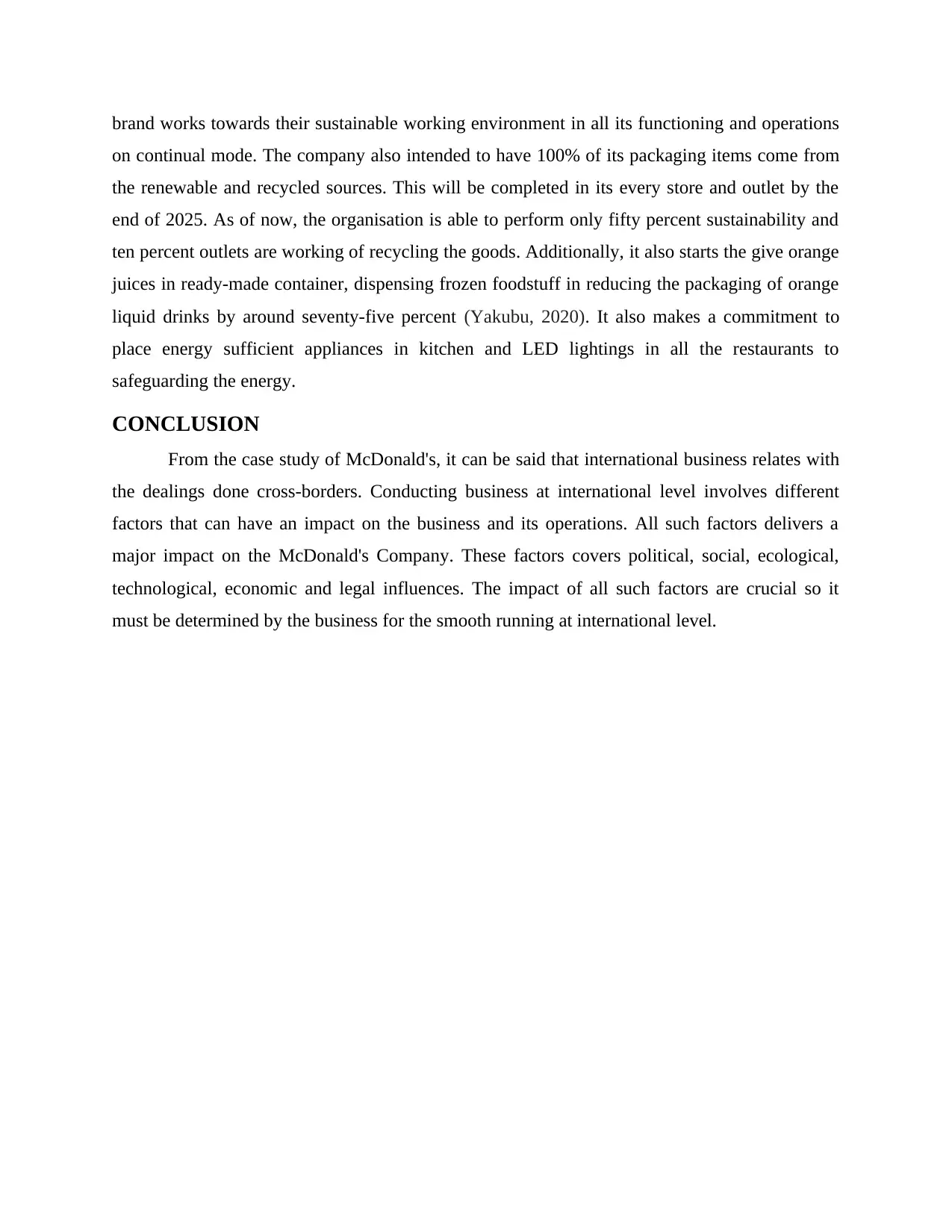
brand works towards their sustainable working environment in all its functioning and operations
on continual mode. The company also intended to have 100% of its packaging items come from
the renewable and recycled sources. This will be completed in its every store and outlet by the
end of 2025. As of now, the organisation is able to perform only fifty percent sustainability and
ten percent outlets are working of recycling the goods. Additionally, it also starts the give orange
juices in ready-made container, dispensing frozen foodstuff in reducing the packaging of orange
liquid drinks by around seventy-five percent (Yakubu, 2020). It also makes a commitment to
place energy sufficient appliances in kitchen and LED lightings in all the restaurants to
safeguarding the energy.
CONCLUSION
From the case study of McDonald's, it can be said that international business relates with
the dealings done cross-borders. Conducting business at international level involves different
factors that can have an impact on the business and its operations. All such factors delivers a
major impact on the McDonald's Company. These factors covers political, social, ecological,
technological, economic and legal influences. The impact of all such factors are crucial so it
must be determined by the business for the smooth running at international level.
on continual mode. The company also intended to have 100% of its packaging items come from
the renewable and recycled sources. This will be completed in its every store and outlet by the
end of 2025. As of now, the organisation is able to perform only fifty percent sustainability and
ten percent outlets are working of recycling the goods. Additionally, it also starts the give orange
juices in ready-made container, dispensing frozen foodstuff in reducing the packaging of orange
liquid drinks by around seventy-five percent (Yakubu, 2020). It also makes a commitment to
place energy sufficient appliances in kitchen and LED lightings in all the restaurants to
safeguarding the energy.
CONCLUSION
From the case study of McDonald's, it can be said that international business relates with
the dealings done cross-borders. Conducting business at international level involves different
factors that can have an impact on the business and its operations. All such factors delivers a
major impact on the McDonald's Company. These factors covers political, social, ecological,
technological, economic and legal influences. The impact of all such factors are crucial so it
must be determined by the business for the smooth running at international level.
Paraphrase This Document
Need a fresh take? Get an instant paraphrase of this document with our AI Paraphraser
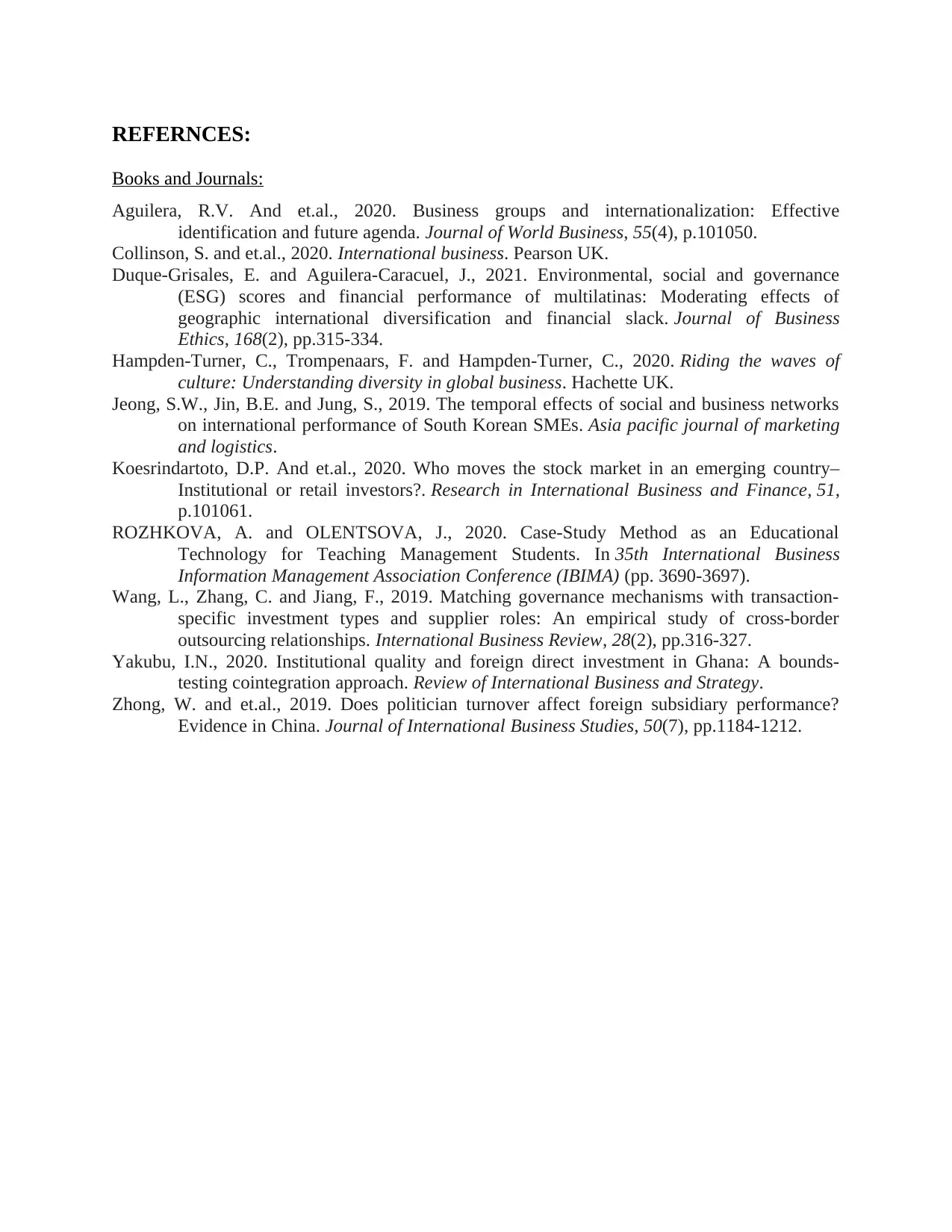
REFERNCES:
Books and Journals:
Aguilera, R.V. And et.al., 2020. Business groups and internationalization: Effective
identification and future agenda. Journal of World Business, 55(4), p.101050.
Collinson, S. and et.al., 2020. International business. Pearson UK.
Duque-Grisales, E. and Aguilera-Caracuel, J., 2021. Environmental, social and governance
(ESG) scores and financial performance of multilatinas: Moderating effects of
geographic international diversification and financial slack. Journal of Business
Ethics, 168(2), pp.315-334.
Hampden-Turner, C., Trompenaars, F. and Hampden-Turner, C., 2020. Riding the waves of
culture: Understanding diversity in global business. Hachette UK.
Jeong, S.W., Jin, B.E. and Jung, S., 2019. The temporal effects of social and business networks
on international performance of South Korean SMEs. Asia pacific journal of marketing
and logistics.
Koesrindartoto, D.P. And et.al., 2020. Who moves the stock market in an emerging country–
Institutional or retail investors?. Research in International Business and Finance, 51,
p.101061.
ROZHKOVA, A. and OLENTSOVA, J., 2020. Case-Study Method as an Educational
Technology for Teaching Management Students. In 35th International Business
Information Management Association Conference (IBIMA) (pp. 3690-3697).
Wang, L., Zhang, C. and Jiang, F., 2019. Matching governance mechanisms with transaction-
specific investment types and supplier roles: An empirical study of cross-border
outsourcing relationships. International Business Review, 28(2), pp.316-327.
Yakubu, I.N., 2020. Institutional quality and foreign direct investment in Ghana: A bounds-
testing cointegration approach. Review of International Business and Strategy.
Zhong, W. and et.al., 2019. Does politician turnover affect foreign subsidiary performance?
Evidence in China. Journal of International Business Studies, 50(7), pp.1184-1212.
Books and Journals:
Aguilera, R.V. And et.al., 2020. Business groups and internationalization: Effective
identification and future agenda. Journal of World Business, 55(4), p.101050.
Collinson, S. and et.al., 2020. International business. Pearson UK.
Duque-Grisales, E. and Aguilera-Caracuel, J., 2021. Environmental, social and governance
(ESG) scores and financial performance of multilatinas: Moderating effects of
geographic international diversification and financial slack. Journal of Business
Ethics, 168(2), pp.315-334.
Hampden-Turner, C., Trompenaars, F. and Hampden-Turner, C., 2020. Riding the waves of
culture: Understanding diversity in global business. Hachette UK.
Jeong, S.W., Jin, B.E. and Jung, S., 2019. The temporal effects of social and business networks
on international performance of South Korean SMEs. Asia pacific journal of marketing
and logistics.
Koesrindartoto, D.P. And et.al., 2020. Who moves the stock market in an emerging country–
Institutional or retail investors?. Research in International Business and Finance, 51,
p.101061.
ROZHKOVA, A. and OLENTSOVA, J., 2020. Case-Study Method as an Educational
Technology for Teaching Management Students. In 35th International Business
Information Management Association Conference (IBIMA) (pp. 3690-3697).
Wang, L., Zhang, C. and Jiang, F., 2019. Matching governance mechanisms with transaction-
specific investment types and supplier roles: An empirical study of cross-border
outsourcing relationships. International Business Review, 28(2), pp.316-327.
Yakubu, I.N., 2020. Institutional quality and foreign direct investment in Ghana: A bounds-
testing cointegration approach. Review of International Business and Strategy.
Zhong, W. and et.al., 2019. Does politician turnover affect foreign subsidiary performance?
Evidence in China. Journal of International Business Studies, 50(7), pp.1184-1212.
1 out of 8
Related Documents
Your All-in-One AI-Powered Toolkit for Academic Success.
+13062052269
info@desklib.com
Available 24*7 on WhatsApp / Email
![[object Object]](/_next/static/media/star-bottom.7253800d.svg)
Unlock your academic potential
Copyright © 2020–2026 A2Z Services. All Rights Reserved. Developed and managed by ZUCOL.




